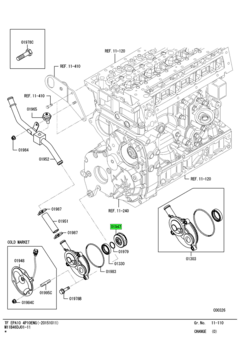This truck part is made by Mitsubishi FUSO®. We guarantee that all of our parts are from the OEM (original equipment manufacturer), ensuring a proper fit and quality manufacturing.
We honor the warranty provided by the original equipment manufacturer.
Positive Crankcase Ventilation (PCV) filters play a critical role in modern engine systems by capturing and removing contaminants from the crankcase ventilation system, protecting the engine from damage, and maintaining optimal performance. These filters are essential for ensuring clean airflow within the engine and reducing harmful emissions.
Functionality
The primary functions of a PCV filter include:
- Capture Contaminants: PCV filters remove oil droplets, dust particles, fuel vapors, and other contaminants from the crankcase ventilation system.
- Prevent Engine Damage: By preventing these contaminants from entering the engine's intake manifold, PCV filters help maintain clean combustion and reduce the risk of engine wear or performance degradation.
- Control Emissions: PCV filters contribute to reducing hydrocarbon emissions by ensuring that oil and fuel vapors are properly managed within the crankcase ventilation system.
Types of PCV Filters
Different types of PCV filters are designed to meet varying engine needs and applications:
Coalescing Filters:
- Use mechanical and chemical processes to capture and condense oil vapors and other contaminants into droplets.
- Ideal for high-efficiency filtration in modern engines.
Cyclone Separators:
- Utilize centrifugal force to separate oil droplets and heavier contaminants from the airflow.
- Commonly used in heavy-duty applications where large volumes of airflow need to be filtered.
Activated Carbon Filters:
- Incorporate activated carbon to adsorb fuel vapors and other volatile organic compounds (VOCs).
- Useful in engines where vapor recovery and emissions control are priorities.
Features and Benefits
PCV filters provide several key advantages, including:
Improved Engine Performance:
- Ensure clean airflow into the intake manifold, which improves combustion efficiency and overall engine performance.
- Contribute to smoother engine operation and reduced wear on components.
Reduced Emissions:
- Prevent unburned hydrocarbons and oil vapors from escaping into the atmosphere, helping engines comply with environmental regulations.
Extended Engine Lifespan:
- Minimize contaminant buildup in critical engine components, reducing the risk of premature wear and tear.
Cost Savings:
- Protect vital engine parts from damage, potentially lowering maintenance and repair costs over time.
Extended Filter Life:
- With proper maintenance, PCV filters can last longer, maintaining their efficiency and reducing the need for frequent replacements.
Industry Standards
PCV filters must adhere to stringent industry standards to ensure quality and performance. Some of the most relevant standards include:
SAE J518c:
- Specifies requirements for hydraulic fluid power systems, ensuring components like PCV filters meet reliability and durability benchmarks.
ISO 3601-2:2016:
- Establishes standards for O-rings and related sealing components, ensuring that PCV filters function effectively in various environmental conditions.
EPA and CARB Regulations:
- Compliance with environmental standards set by the Environmental Protection Agency (EPA) and California Air Resources Board (CARB) ensures that PCV systems contribute to emission reductions.
Best Practices
To ensure PCV filters function effectively and provide long-lasting benefits, follow these best practices:
Regular Maintenance:
- Inspect PCV filters periodically for wear, damage, or clogging.
- Replace filters according to the manufacturer’s recommendations or sooner if performance issues are detected.
Proper Installation:
- Ensure PCV filters are installed correctly, following the engine manufacturer’s guidelines to avoid air leaks or improper filtration.
Monitor Performance:
- Regularly monitor the performance of the PCV system, paying attention to signs of reduced airflow, increased emissions, or oil buildup in the intake manifold.
Choose the Right Filter:
- Use filters that are compatible with the specific engine model and application to maximize effectiveness and reliability.
Educate Operators:
- Provide engine operators with guidance on identifying potential PCV filter issues and the importance of timely maintenance.
History of Positive Crankcase Ventilation (PCV) Filters
The concept of PCV filters dates back to the early 20th century, when engineers began searching for ways to improve engine performance and reduce emissions.
Early Development
In the 1920s and 1930s, researchers experimented with various methods for capturing and removing contaminants from the crankcase ventilation system. One early approach involved using paper filters, which were later replaced by more advanced materials like cotton gauze and metal mesh.
Post-WWII Advancements
Following World War II, the development of PCV filters accelerated as manufacturers sought to improve engine performance and reduce emissions. The introduction of new materials like activated carbon and synthetic fibers led to the creation of more effective PCV filters.
1960s-1970s: Increased Regulation
The 1960s and 1970s saw increased regulation and standards for emissions control, leading to further advancements in PCV filter technology. Manufacturers began developing more sophisticated filters that could capture a wider range of contaminants.
1980s-Present: Modern Developments
In recent decades, the development of PCV filters has continued to advance, driven by technological innovations like nanotechnology and advanced materials science. Modern PCV filters are designed to meet stringent industry standards for performance and durability.
Key Milestones
- 1920s-1930s: Early experimentation with PCV filters using paper, cotton gauze, and metal mesh.
- Post-WWII: Introduction of new materials like activated carbon and synthetic fibers.
- 1960s-1970s: Increased regulation and standards for emissions control drive advancements in PCV filter technology.
- 1980s-Present: Modern developments in nanotechnology and advanced materials science lead to more effective PCV filters.
Industry Influencers
Several key players have contributed to the development of PCV filters over the years, including:
- General Motors: GM introduced one of the first commercial PCV systems in the 1950s.
- Ford Motor Company: Ford developed advanced PCV filter technology in the 1960s and 1970s.
- Chrysler Corporation: Chrysler played a significant role in developing PCV filters for diesel engines.

